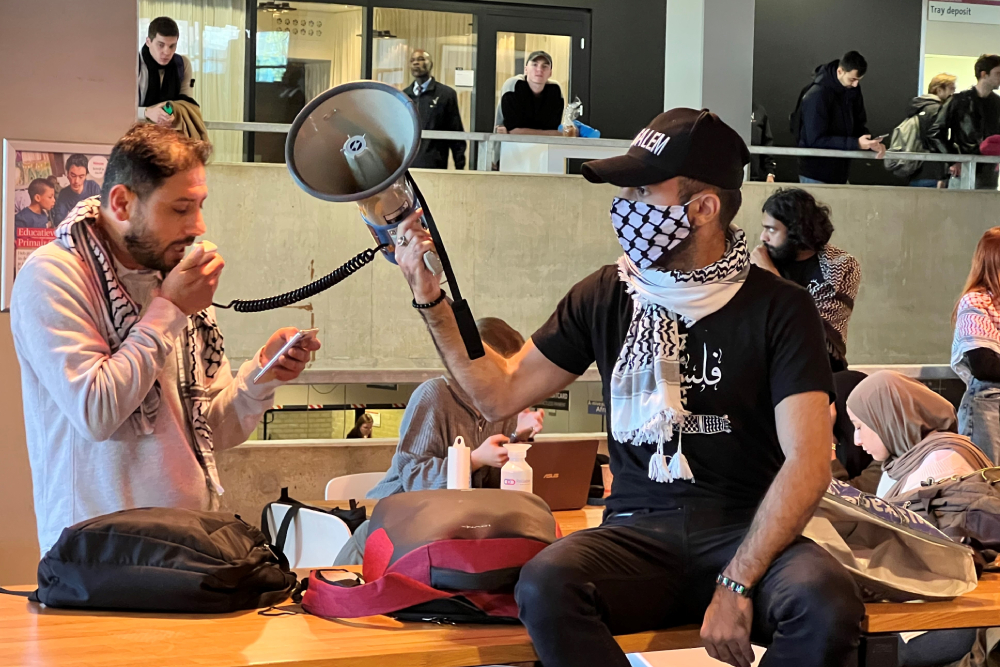VU has been extremely conservative when it comes to permitting Gaza debates on campus, the works council thinks. “Much more conservative than the other Dutch universities”, a works council member said yesterday during a meeting of the council with the Executive Board.
She referred to the rector of Erasmus University, who had said that offering space for the Gaza debate was also important for the feeling of “belonging” amongst the students. VU, on the other hand, had prohibited a teach-in about Gaza, the third in a series.
VU makes an exception in this regard for gatherings on Israel and Palestine, the works council had observed, because for registering an activity themed around this subject a special arrangement is in place.
Knowledge exchange without polarisation
But yesterday, VU announced on its website that it’s lowering the threshold for organising gatherings on Gaza and Israel. Deans or other administrators will no longer assess beforehand whether a gathering on Gaza can go ahead.
VU does expressly refer to an “academic knowledge exchange” that “shouldn’t lead to further polarisation or a threat to the feeling of safety.” What’s more, Marcel Nollen of the Executive Board said to the works council that it only concerns gatherings “by and for students and staff at VU Amsterdam”. All of them must be announced as well. VU will come down harder on unannounced actions, such as the sit-in that was held at the VU restaurant and recently at a Bachelor’s day as well, where people with facial coverings made a lot of noise by beating on drums for 45 minutes.
“People experience that as threatening”, said rector Jeroen Geurts. He also said he wants to get rid of the “persistent story” that VU reportedly prohibited a teach-in. “We had critical questions”, according to the rector, “and the organisers thought that was taking too long, so they ended up having the teach-in somewhere off campus.”
Creating obstacles
He also refutes that VU regularly prohibits such gatherings. The works council member then said that multiple colleagues who wanted to organise a gathering were confronted with so many obstacles that they did in fact experience it as a prohibition.
She said she understands very well how difficult the matter is for the Executive Board. Geurts said that the Executive Board receives many registered letters from lawyers, as well as threatening emails. “We feel the pressure from all sides and whether you take a step forwards, backwards, to the side or no step at all, you’re always doing it wrong.” According to him, a certain group of people is “just angry all the time”, although most people are prepared to discuss and listen.
At VU, as opposed to other universities, it has been relatively calm and according to the rector that is thanks to the fact that they’ve taken such a conservative stance. VU first wanted to give people with ties to Israel and Gaza space for their sadness and make sure that the facilitation of activities is done in a safe and careful way.
Collaborating with Israel
VU is equally careful in revealing its ties with Israeli universities, institutions and companies, and with organisations that propagate support for the state of Israel, as the organisation The Rights Forum requested all Dutch universities to do. As this happened in the context of the Government Information (Public Access) Act (called Open Government Act nowadays), VU − being a private university − isn’t obligated to honour such a request. Another reason for its refusal is that it creates “feelings of unsafety, injustice and discrimination”, stated the Executive Board in 2022.
The works council revisited the subject yesterday. The rector said that he would have preferred it if the Rights Forum had requested to look into whether some collaboration projects with Israel are actually sensible. “Let it be clear that institutes that call for the destruction of parts of the world aren’t a good fit for us”, according the rector.
The works council member thinks the problem will solve itself. After all, the minister of Education has announced that universities have to speed things up when it comes to revealing all international partnerships. She also referred to a book, Towers of Ivory and Steel by Maya Wind, about the involvement of Israeli universities in the repression of the Palestinians.

“He also refutes that VU regularly prohibits such gatherings.” This is not the case. Students for Palestine repeatedly had their events shut down at the last minute, often on the day of the event itself, when they were pre-scheduled at 3D. This was for events as simple as a hummus making workshop before the events of October 7th. Similarly, they discouraged extinction rebellion legal trainings happening in the Green Office. If the VU wants to educate students to think critically about the world, they must provide adequate and accessible space on campus for students to put such skills into practice